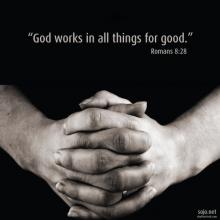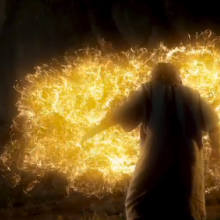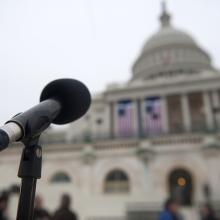Scripture
The Jews believe that the Messiah is yet to come.
Christians believe the Messiah is coming back.
Those of other – or no – religions haven’t noticed much difference and don’t really care.
But all would agree that there is plenty of work left to be done.
We, by any standard, are far from an age of any Messiah — an era of justice, peace, and restoration seems as distant or alien or even incomprehensible as a blockbuster sci-fi film.
But perhaps, in some odd way, that is the point.
How far can one go in retelling a Bible story, adding things that are not in the original? In The Testament of Mary, Colm Toibin goes a long way.
His 2012 book is now a Broadway play presenting a view of the mother of Jesus so different from pious tradition that it angers some Christians, creating a “new,” intellectually and spiritually challenging Virgin Mary.
Yet in the end, Toibin’s searingly human Mary may be ultimately more accessible than the Mary of porcelain perfection set high on a pedestal.
The Irish writer, who has written about his strong Catholic childhood, imagines Mary 30 years after the crucifixion of her son. She lives as a virtual prisoner of two of Jesus’ disciples, still mourning her son’s death, bitter at what has happened since, and seeking consolation from pagan idols, which make more sense to her than what happened to Jesus.
Life is difficult. It can knock you down. Sometimes, an entire nation gets knocked down.
First it was Boston. Some mad man (or men) lays waste to one of America’s most hallowed sporting events — the Boston Marathon. Sidewalks that should have been covered with confetti were covered in blood.
Then it was the quintessential small Texas town of West. Populated by hearty Czech immigrants, folks in West worked hard in their shops, bakeries, and fertilizer plant until the plant exploded. A magnitude-2.1 on the Richter scale, witnesses compared it to a nuclear bomb. Dozens are feared dead.
In the nation’s capital, we had the bitter realization that something is broken that will not be easily repaired. A commonsense proposal that emerged from the Newtown, Conn., tragedy, background checks to prevent convicted felons and the seriously mentally ill from purchasing guns online or at gun shows, fell prey to Washington gridlock. None of the Newtown proposals — the ban on assault weapons, limits on the number of bullets a gun can hold or expanded background checks — could garner the 60 votes necessary to overcome a Senate filibuster.
Finally, there were the ricin-laced letters sent to a Republican senator and the president.
- Preaching God's Transforming Justice, edited by Dale P. Andrews, Dawn Ottoni-Wilhelm, and Ronald J. Allen, is a lectionary commentary series from Westminster John Knox Press that helps preachers better proclaim the biblical call to be agents of God's love and justice in the world. Embodying that mission in a small but key way, the 90 contributors include close to equal numbers of women and men and represent significant ethnic and racial diversity. Each volume provides commentary for all the year's lectionary days, plus essays on 22 "Holy Days of Justice," from World AIDS Day to Children's Sabbaths. The first two volumes, for Years B and C, are already available. The Year A volume is due for release in August.
- The Revised Common Lectionary's readings for each Sunday—four selected scriptures, generally one each from the Psalms, the rest of the Hebrew Bible, the epistles, and the gospels—are heard by millions of Christians each week. Timothy Matthew Slemmons, an assistant professor of homiletics and worship at the University of Dubuque Theological Seminary, has been captivated by what isn't heard. In Year D: A Quadrennial Supplement to the Revised Common Lectionary (Cascade Books), he argues for an expansion of the lectionary in order to present a fuller portrait of God's revelation. It includes a proposed one-year set of readings that does not shy away from many difficult texts, including from the Psalms and prophets.
DREAMS CAN serve a powerful purpose. Jacob dreamed a ladder and was renamed Israel. Joseph dreamed the sun and moon and stars and was sold into slavery. The magi dreamed a warning and returned home by way of another road.
Years ago I had a dream. I sat, a child, on a dirt floor. Around me paced a horse, saddled, ready. In front stood an immense door, cathedral-tall and brooding. And though open, the space within was dark. I was holding a light. And in the dream, I knew we were to bring light into that darkness. And the darkness—the darkness was the church.
In Truth Speaks to Power: The Countercultural Nature of Scripture, Walter Brueggemann, professor emeritus of Old Testament at Columbia Theological Seminary, bears light to the exegetical (seminary lingo for interpretive) work and examination of the interplay between truth and power found in both familiar and less familiar narratives of Old Testament scripture. Rigorous in content, the read is nevertheless accessible to scholar and novice alike.
Brueggemann's concern with the interplay of truth and power rests on the observation that far too often truth, even biblical truth, is found colluding with and legitimizing the self-serving and self-preserving agenda of totalistic and monopolizing authorities. To use biblical imagery, truth sides with the Pharaohs and the Solomons of the world and not with those on its margins and periphery.
The first two chapters draw on Brueggemann's impressive scholarship of Old Testament text and narrative to paint a disconcerting picture where not only are the bad guys truly bad, the good guys aren't any better. Take Joseph, the Technicolor-dreamer-slave become all-powerful-vizier (think prime minister) of Egypt. It is Joseph's land acquisition scheme, strategically implemented amid drought and famine, that results in Pharaoh controlling most of Egypt's wealth. It is Joseph who creates a permanent peasant underclass—the very class that will cry out for liberation from the injustice of having to bake bricks with no straw. And Solomon—well, you know something's gone terribly amiss when your empire accumulates "six hundred sixty-six talents of gold" (1 Kings 10:14) each year. If you don't see the editorial subtext, write it out numerically. Ouch!
NEW YORK CITY has been bombed at least twice in the past decade. First by al Qaeda and second by Hurricane Sandy.
In the wake of the Sept. 11 attacks, the United States launched two ground wars and a worldwide "war on terror." Within two months, Congress federalized the Transportation Security Administration to secure airports. More than 263 government organizations were either created or reorganized. Some 1,931 private companies were put to work on counterterrorism, homeland security, and intelligence. Rightly or wrongly, America moved heaven and earth to stop terrorism in its tracks. It was seen as both an ongoing threat and a moral affront that had to be dealt with.
What about Climate Change?
In February, a New York State Senate task force on Superstorm Sandy compared the hurricane that affected 24 states to the 9/11 terrorist attacks. "[On 9/11] there were more than 3,000 souls lost, but in terms of the geographic destruction, it was isolated to Lower Manhattan," said Sen. Andrew Lanza (R-Staten Island). "[After Sandy] we have miles and miles and miles of destruction. Hundreds of thousands of homes affected, 60 ... New Yorkers killed, 250,000 to 260,000 businesses affected."
Hurricane Sandy killed 253 people in seven countries. It was the second largest Atlantic hurricane ever recorded—and the most expensive. It smashed into the East Coast with barely three days' warning. Like hurricanes Katrina and Rita before it, Sandy was a disaster of biblical proportions.
After 9/11, Americans knew in our gut that something was seriously wrong. Our moral intuition had been sucker punched.
HOW SHALL WE engage with scripture through all 50 days of Easter? There are clues in the haunting story of Jesus' appearance beside the sea of Tiberius. After Easter Day many of us are ready to let things quickly revert to normal. It is, strangely, both reassuring and uncomfortable to hear that those disciples, whose business had been fishing, wanted to get back to their boats so promptly after the horrors and wonders they had witnessed in Jerusalem.
Jesus is waiting for them by the shore with breakfast already cooking. All is ready, yet he wants them to bring some of what they haul up in their nets, so he can include samples of their own catch in the menu. And what a catch it was!
Easter is our time to experience the grace that is always ahead of our game and is underway for us before we are ready. Yet grace does not exclude what we bring to the table. Grace expects and includes the work of our hands, the weavings of our imaginations, and the gifts of our unique experiences. In one sense, Eastertide is more truly a season of repentance than is Lent. One thing we might need to repent of is our passivity—those times when we expect God to hand us on a plate the meaning we are hungry for. We need to bring our own bits to the cooking fire if we are to really eat with Jesus. It is part of the mix of grace that we must participate, not just receive.
THE CHURCH IS locked in a polarized debate around same-sex relationships that is creating painful divisions, subverting the church's missional intent, and damaging the credibility of its witness. We've all heard the sound-bite arguments. For some, condoning or blessing same-sex relationships betrays the clear teaching of the Bible, and represents a capitulation to the self-gratifying, permissive sexual ethic of a secularized culture. For others, affirming same-sex relationships flows from the command to love our neighbor, embodies the love of Jesus, and honors the spiritual integrity and experience of gay and lesbian brothers and sisters.
The way the debate presently is framed makes productive dialogue difficult. People talk past one another. Biblical texts collide with the testimony of human experience. The stakes of the debate become elevated from a difference around ethical discernment to the preservation of the gospel's integrity—for both sides. Lines get drawn in the ecclesiastical sand. Some decide that to be "pure" they must separate themselves spiritually from others and break the fellowship of Christ's body. Then the debate devolves into public wrangling over judicial proceedings, constitutional interpretations, and property ownership. Meanwhile, the "nones," those who are walking away from any active relig-ious faith, find further confirmation for their growing estrangement.
Mirroring the dynamics of contemporary secular politics, the debate is driven by small but vocal minorities with uncompromising positions at one end or another of the spectrum. For the majority in the middle, who may be unclear about their own understandings, exploring their questions is made difficult because of the polarized toxicity of the debate. Further, those in positions of leadership in congregations or denominations come to regard the controversy over same-sex relationships as the "third rail" of church politics. They don't want to touch it. I know this because I've been there myself.
The Bible. Just the phrase sends messages, signals, and feelings to our hearts and minds, and around the world. It’s the best-selling book in human history, and one that the majority of humanity (including me), believes to have been inspired by God, with myriad interpretations of what that means.
I grew up on Bible stories, some of the best stories in human and divine history. We learned them as kids, were amazed at the images and lessons, and they were ingrained into our thinking and acting. So I watched with great delight as my sons, Luke and Jack, saw the first episode of “The Bible,” a History Channel special series that began this past Sunday and runs the five weeks through Easter. Film and television personalities Mark Burnett and Roma Downey are behind this, with a legion of others. They expect it to eventually be seen by 1 billion people.
The first Sunday show was a very dramatic depiction of the creation story, Noah’s Ark, Abraham’s call to come out to a new land, the birth of Ishmael and Isaac, the almost sacrifice of Isaac, Hebrew slavery in Egypt, Moses' call at the burning bush, and the Exodus through the Red Sea — all in two hours! I loved watching my 9-year-old Jack watch the stories with such excitement. “I know this story!” he would say and tell us what was about to happen. “I don’t know this one,” he would then comment, and we would discuss it. We had a conversation about the scary sacrifice of Isaac before bedtime, trying to figure that one out. I told him I couldn’t have been as obedient as Abraham was.
ONCE UPON A TIME, long before there were birth certificates or Social Security numbers, there were immigrants. If you are or have been an immigrant without documents, you may think life must have been easier then, that you would never be afraid of getting found out and deported.
But life was not easier—at least not in the first century C.E., in the five mostly rural Roman provinces in what is now Turkey. Especially if you were a follower of Jesus.
As an immigrant, you are called by one of two names in Greek, the trade language of the time. You are a paroikos if you had fled or been forced from your native community for any personal, economic, or political reason and were trying to eke out a living in a foreign land. Oikos refers to "house" or the economic structure of the extended household in which native people lived. Para means "alongside of." In other words, you are "away from home," a resident alien on the edges of ordinary life.
Consequently, you have fewer rights than full citizens. Never able to own land, you are a sharecropper, a craftsperson, or perhaps a small trader or shopkeeper. You may have been driven off your land by high taxes you could not pay, or perhaps you are a second son and will not inherit your father's land. You may be the wife or daughter of such a man, or a widow driven to support yourself and your children. You have legal restrictions regarding intermarriage, commerce, and succession of property. You have no political rights, such as voting in public assemblies or joining in guilds. Unlike citizens, if you are charged with a crime, you can be tortured.
DURING THE SUMMER of 2003, 25 staff of InterVarsity Christian Fellowship and their families rode a bus through 10 states on the "Pilgrimage for Reconciliation." We retraced the Cherokee Trail of Tears and explored the journey of African Americans from slavery to the civil rights movement.
As we rolled over land that had witnessed the most evil individual acts and public policies enacted on American soil, and as we heard again and again how the church was either silent or complicit, we wondered aloud: "What issue will cause our grandchildren to look back at us and ask, 'Where were you?'"
There are many we could choose from. But on this day, approaching spring 2013—a decade after our pilgrimage, 50 years after Dr. King's "Letter from Birmingham Jail," 150 years after the Emancipation Proclamation—I know where I stand. On this day, I stand with my sisters and brothers in the church who are pressing our nation's leaders toward just and comprehensive immigration reform.
In the last three years, more than 1 million men, women, and children have been erased from our land through deportation. They were caught between two signs at our border: "Help Wanted" and "No Trespassing."
By law, only 5,000 "unskilled" workers are allowed into the U.S. through legal means each year. That is about the number of people processed on Ellis Island every day in the early 1900s. Meanwhile, our nation's industry and food supply rely heavily on the labor of immigrant populations. About 75 percent of all U.S. farmworkers are unauthorized immigrants. Then consider other industries: meatpacking, hospitality, restaurants, transportation. The disparity between the demand for workers and the supply is untenable.
I wonder if God reads the Bible. I mean, what we’re trying to do when we read the text is to understand it the way God understands it, right? I grew up in fundamentalist churches where biblical authority derived from the belief that God wrote it. I remember writing a paper at my Baptist college in which I said God “inspired” the authors to write what they had written; my Bible professor corrected me, saying God had inspired the text itself. I know he was just trying to fortify in me the doctrine of inerrancy. In this view, authority lies in God’s breathing of the Word, in what God meant when he wrote it. God speaks; we try to understand.
But what if God reads the Bible? And what if, as feminist Bible scholar Claudia Camp argues, scriptural authority “is always understood in relation to the authority of persons?" (p. 61) In one sense, this conclusion is inescapable. Paul’s second letter to Timothy may give us intra-biblical proof of the Bible’s own “inspiration,” but that’s a kind of circular reasoning, isn’t it? The Bible did not decide for itself what it was. By the time I wrote that college paper, Rodney Clapp’s book A Peculiar People had already opened my eyes to the very human process that gave us the Bible. It did not drop out of the sky like spittle from the mouth of God; the church drew water from the rivers of wisdom, put it in the containers of the old and new testaments, law, prophets, and Gospel, and discarded what the church deemed unnecessary. It was a messy, political process like any collective endeavor.
President Obama will publicly take the oath of office on two Bibles once owned by his political heroes, Abraham Lincoln and the Rev. Martin Luther King Jr. One Bible was well read, but cited cautiously, the other granted scriptural sanction to the civil rights movement.
When Obama lifts his hands from the Bibles and turns to deliver his second inaugural address on Monday (Jan. 21), his own approach to Scripture will come into view. Characteristically, it sits somewhere between the former president and famous preacher.
His faith forged in the black church, Obama draws deeply on its blending of biblical narratives with contemporary issues such as racism and poverty. But like Lincoln, Obama also acknowledges that Americans sometimes invoke the same Bible to argue past each other, and that Scripture itself counsels against sanctimony.
Obama articulated this view most clearly in a 2006 speech, saying that secularists shouldn’t bar believers from the public square, but neither should people of faith expect America to be one vast amen corner.
“He understands that you can appeal to people on religious grounds,” said Jeffrey Siker, a theology professor at Loyola Marymount University in California who has studied Obama’s speeches. ”But you also have to be able to translate your case into arguments that people of different faiths, or no faith, can grasp.”
In As I Lay Dying, the main character Anse appears self-absorbed when at his wife’s death he says, “God’s will be done. . . . Now I can get them teeth.” His character will certainly not be remembered for altruism. But Anse will be remembered for the physical effects of poverty: feet marred by labor, a spine permanently bent, skin unable to sweat from sunstroke suffered tending the fields, and a mouth without teeth.
To be clear, poverty itself does not cause dental issues. A local dentist reminds me, “Ancient skulls have minimal tooth loss. Rough grains cause more wear. For the most part rich, processed, sugary, and poorly nutritious foods destroy teeth.”
Dentistry may feel far removed from Epiphany: astronomical sighting, magi from the east, and three extravagant gifts. But I wonder, given the knowledge of these precious gifts and their use in that time for dental care, if perhaps that frankincense and myrrh would protect that winsome smile of Christ for the next three decades of his life. With these rich gifts in hand, the trio Mary, Joseph, and Jesus could leave to the safety of Egypt before Herod would threaten the life of Christ and every other young boy under two.
Is poverty what it used to be? Or has poverty grown so shameful that we dare not speak its name? So determined are we keep poverty out of view, we erase the presence of the poor from Jesus’ teachings. The widow we encounter in Mark 12:38-44 provides a case study in poverty and oppression. Unable to confront poverty, we have turned her into something safer – an example of generosity.
The election has just passed. As I’m writing this, I don’t know who will win. I do know this: neither presidential candidate could work up the courage to address poverty as a serious issue, at least not directly. If Democrats typically look out for the poor, you wouldn’t know it from President Obama; Mitt Romney mentioned the poor more often than did the president, if only to remind voters that the economy is struggling. For his part, Obama avoided the “p-word,” even if he discussed policies that could remedy the poverty problem. Some of our political leaders do include the poor in their policy work, but they face an uphill struggle.
There’s a lot at stake here. By trying to turn the Jewish poetry of the Genesis story into a scientific-historical text that would stand against evolution, Creationism, as an ideology, serves to diminish the account of human dignity established in the Creation story that might, in fact, represent a worthy alternative to Darwinism. Says [Marilynne] Robinson: “People who insist that the sacredness of Scripture depends on belief in creation in a literal six days seem never to insist on a literal reading of ‘to him who asks, give,’ or ‘sell what you have and give the money to the poor.’ In fact, their politics and economics align themselves quite precisely with those of their adversaries, who yearn to disburden themselves of the weak, and to unshackle the great creative forces of competition. The defenders of ‘religion’ have made religion seem foolish while rendering it mute in the face of a prolonged and highly effective assault on the poor.”
Debates on immigration in the United States continue to move in the default direction of North/South. As such, the prominent debating points often direct public attention to the U.S./Mexico border fence and the Latina/o community. By sleight-of-hand, many in the mainstream media tend to recast a centuries-old U.S. immigration experience as a Latina/o problem.
Unlike the variety of migration stories in the Bible, the forces creating migration for many Latina/o families are closely tied to the issues of power and hyper-consumerism. Often as a last resort do immigrant families enter the northbound currents of low-wage laborers that, as Bishop Minerva Carcaño describes, feed “the economic machine in this country.”
Since the establishment of The Council for Biblical Manhood and Womanhood in 1987 and J.I. Packer’s 1991 article “Let’s Stop Making Women Presbyters” in Christianity Today, there’s been a resurgence of traditionalist theology among some American churches. Instead of advocating “male headship,” they now promote “complementarianism.” Instead of portraying women as intrinsically “serving, subordinate, and supportive,” they now advocate “biblical womanhood.” But it’s the same patriarchal heresy, just with new language.
Rachel Held Evans, a Tennessee-based evangelical Christian raised in conservative Christian churches, decided to turn the tables. She vowed to take all of the Bible’s instructions for women as literally as possible for a year. A Year of Biblical Womanhood: How a Liberated Woman Found Herself Sitting on Her Roof, Covering Her Head, and Calling Her Husband Master is the often-hilarious, engaging, well-researched, deadly serious result. (You can read all about her adventures at rachelheldevans.com). Former Sojourners editorial assistant Betsy Shirley, a student at Yale Divinity School, interviewed Evans in August 2012.
Biblical literalism, and the corresponding idea of the inerrancy of scripture, has been bumping up against the sciences for a long time.
Way back in the Renaissance, the church insisted that the Bible taught that the sun revolved around the earth, and charged Galileo with heresy for claiming otherwise. Today, the debate between the Bible and natural science continues, most notably in the evolution/creation debate.
While discussions of religion and science usually revolve around conflicts with natural science, I'd like to propose that the place we really should be placing our attention is the relationship between faith and the social sciences.
As our understanding of all science grows, it becomes harder and harder to maintain the position of biblical literalism without seeming absurd.
Maybe we haven't all heard the thunder clap yet, but the lightning bolt struck a while ago. We are going to have to adjust our reading of the Bible to coincide with a modern scientific understanding of the universe. In broad strokes, that shift has already happened.
Listening to the scriptures requires a gentle determination to remove the filters that tend, in our religious culture, to allow in only what serves individual solace or personal edification. The scriptures probe the realities of power, how it is cornered, monopolized, deployed, lost, and regained at every level—in societies, in institutions, in families—as well as in the dynamics of our own lives. Even the best Bible study groups and sermons often surrender to the bias exerted unconsciously by our own individual neediness. Perhaps a conscious policy is needed to heed the word of God as it dissects the social body, lays bare its anatomy, and reveals its diseases. This approach may have a greater impact on our personal lives than conventional piety.
Far from reducing the spirituality of our engagement with scripture, learning its hermeneutic of power is likely to intensify our appreciation of its relevance to our own immediate issues and needs. As persons, we internalize and encapsulate the forces at work on a larger scale in a struggling world. God is wholly present as redemptive, suffering, hope-engendering love at every level of existence—from the inner dynamics of the soul to couples, families, neighborhoods, nations, the planet, and the entire universe. One of the most ancient religious instincts of humanity gave rise to the concept of the human person as a microcosm, a world in miniature. Scripture’s word is addressed to us in our unique personhood, and to the churches, communities, and nations in which we are embedded.












